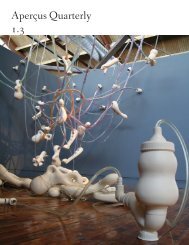Aperçus Quarterly 2.1
Aperçus Quarterly 2.1 - Apercus Quarterly
Aperçus Quarterly 2.1 - Apercus Quarterly
Create successful ePaper yourself
Turn your PDF publications into a flip-book with our unique Google optimized e-Paper software.
on earth. I stowed away atop the Train of Dead for twenty-four hours across the Bolivian Amazon, only to beinvited in as the guest of the drug cartel during Carnival where I appeared on television robed as a Witch Doctor.Stories led me in and out of trouble. Stories were my road and currency, listening to them as much as tellingthem. I had been a fairly shy person before all of this. I feel as though my adult self was born somewhere along thathighway.LH: Dancing and howling with an ancient nun on top of an apartment building—my God! You must feel so luckyto have experienced all of this. Were you also writing during this time?CS: Yes, I was writing a great deal in notebooks, a kind of rambling, poetic prose, broken up by poem fragments.Writing helped me to see more clearly. While watching a hawk in the desert flap in one direction, even as it driftedbackwards in a hard wind, I came to understand time differently, that I was a traveler in time more than in distance,that I crossed each hour as a small personal desert. I carried William Carlos Williams with me into theAmazon to encourage precision and restraint against all that wild green abundance. I filled up several notebookswith these writings. The poems didn’t amount to much, but I published a couple of them in an early chapbookcalled Mushrooms.LH: Your latest book is Wolf ’s Milk: The Lost Notebooks of Juan Sweeney. You are credited as translator for thiscollection originally written by Juan Sweeney of the Copper Mines, in his native Spanish. In the translator’s noteyou mention that you “do not like his poetry much,” and yet you also state that the poems have “branded [you]forever.” How were you able to take on the arduous task of translating these poem fragments, which you found “inthe walls of Sweeney castle,” with such contradictory feelings inside of you?CS: Well, some people think of the role of translator as one of humility, of near invisibility, but when I engage Juan’spoems I feel like we’re in a wrestling match to the death, the way Lorca describes duende, that the poet must wrestlethe earth spirit “on the rim of the well”; in Juan Sweeney’s case, I play the bull trying to pin Sweeney’s red capeagainst his teeth to stop him from singing during the funeral of the dahlias. When I found his “lost notebooks” inthe walls of Sweeney Castle, I knew it was my job to translate the poems, even if against my will. Juan possesses allof the worst family traits from the Spanish branch of our Irish line, which goes all the way back to King Sweeneythe Mad. It may be that I recognize myself in Juan, and that I don’t like what I see; however, I’ve also learned to appreciate,at least mildly, his authentic nature and his legitimate struggle to understand himself. This second qualitymakes his poems bearable. He approaches the world in mad love and terror, afraid of loving too much but unableto stop himself from loving. He runs toward and away from everything with equal force in a state of romantic solipsism:“The houses are empty. / I am nowhere to be found./ I run through the streets calling my name.” His poemsare the result of these spasms of music.LH: When you mentioned Juan’s “legitimate struggle to understand himself,” a light bulb went on for me. I originallyformed a question around a feeling that Juan was “toying” with me as a reader, feeding me half-truths oneat a time like grapes but never giving me the entire bunch. I’m reminded of the fifth poem that begins, “I think inEnglish but I speak in Spanish./ I smoke in Catalan but I drink in French.” And then, the final stanza: “From theox I learned patience. No, I never learned patience.” And let’s not forget that utterly intriguing first line of the firstpoem, “At least my lies are honest,” which suggests that the entire book is a lie. Of course we don’t really believethis, do we?CS: It’s not that he’s lying, Lauren. He believes fully in everything he says, but his feelings and outlooks changecontinually, as if he were a puppet animated by the spiritus mundi as it blows west then east. When asked whichof his seventeen grandmothers he loved best, he replied, “Whichever I’m with, of course!” This is an importantinsight into his personality. And he explained his technique for cleaning the mirror as: “First I make a list of tools,/then I walk in the opposite direction./ If you live here long enough/ you’ll know me.” In most of the love poems,the timbre of bravado includes a counter-note of doubt, as if Juan is scanning the room for an exit, but I get the42



